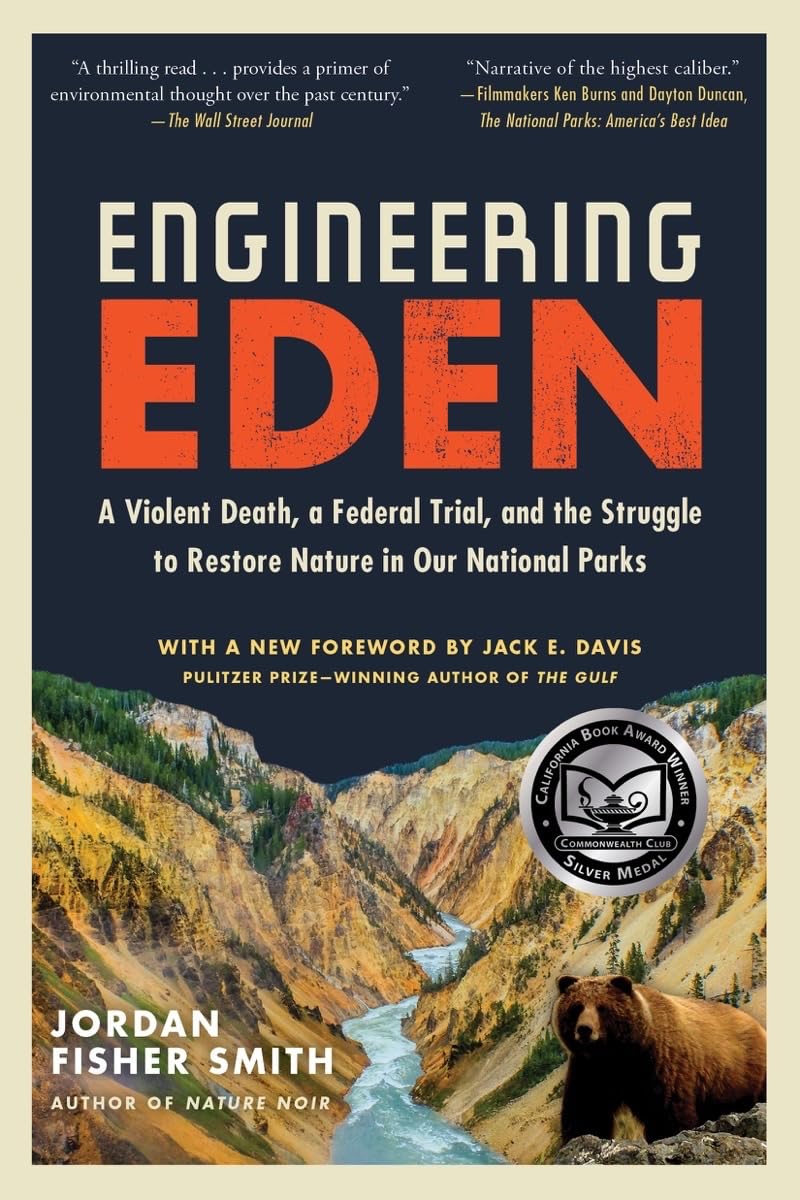

Engineering Eden: The True Story of a Violent Death, a Trial, and the Fight over Controlling Nature
D**A
Great historical accounting of defining moments and often tragic events subsequent to man's intervention in nature!
I found this book by Jordan Fisher Smith to be an intriguing historical accounting of the various interactions and interventions of humans in nature, specifically the National Parks and the consequences, both intended and unintended that are left behind. This true tale of park and wildlife management and the tragic incidents that occur as a result of the winding road of decision making demonstrates the difficulty that developed when attempting to adhere to the polar philosophies of those making the decisions. The question--to intervene or not to intervene? The author weaves in specific events such as the death of Harry Walker by a grizzly in Yellowstone in 1972 that perpetuate the question of good decisions and bad decisions made by both the stewards of the National Parks and the individuals who utilize them.The book explores the difficulty of creating a peaceful coexistence of humans and wild animals in the ecosystems in which they now live and roam.. Historical accountings of places and events allow for a review of what has been done and often it is in evaluating this history where learning occurs. The author has done extensive research and outlines the differing philosophies and actions that have been applied to the management of the National Parks. He speaks of real people and is able to characterize them in such a way that the reader can easily feel connected to them in one way or another. This makes you feel that you are in the middle of the drama created in the tale and puts you in the position to ask yourself, "What would I do?" Aside from the miscreant behavior of some, I could easily agree with opposing philosophies that are presented and I could have and probably did camp in areas not designated for camping at an earlier time in my life. After reading this book, I have a renewed appreciation for following the rules and using logical thinking in making a decision. Good decisions can have bad outcomes but more often, bad decisions will have bad outcomes. The best you can do is try to make the best decision with all of the information which is given to you.I appreciate all of the information given in this book and believe it is a great book for all to read, not just those interested in Wildlife Biology or other specific fields as some reviewers have mentioned.. We all live in nature and are exposed to animals of some sort living in our environment and most of us have traveled to national parks at some time in our life. Education begins with awareness and this book opens your eyes to becoming more cautious about actions that could have serious impact on yourself, others, animals or the environment. It also leaves you with hope that we can get it right with collective input that can help to move closer to the Edenic balance present before the destruction caused by human intervention!
S**N
Nature Noir's author delivers a solid and intelligent treatment of the meaning of nature and natural in today's messy world.
Engineering Eden is an important and compelling work, tackling the philosophies and underpinnings of "natural" resource management. Told in a style which interweaves personal stories and personality profiles with grim statistics and bureaucratic processes, peppered with insights and seasoned with deep understanding of how resource managers develop their guidance documents and action plans, the book drew me in to a world I recognize and value. The recounted conversations and debates concerning the meaning of natural, wilderness, and the role of modern humans in resource management are concise and echo many of my own personal after hours beer-fueled and heated arguments with fellow park professionals. The questions Mr. Fisher Smith asks are fair, and he avoids the easy Monday morning quarter back role of finger-pointing when the best laid plans of the National Park Service managers go astray. Big issues such as multiple species management in a changing climate, population control and succession receive intelligent treatment here. Human tinkering with natural systems, artificial clock-setting with respect to desired condition, and intervention versus non-intervention are topics which are as fresh today as ever.Enlivened with enough human drama for any reader, the dispassionate reporting of human-bear interactions need no embellishments. Flipping back and forth from the courtroom to the wilderness, from the office to the field station, time is handled as a mutable character, requiring the reader to have patience....the verdict WILL be read; the decision WILL be made. The complexities of the subjects are all given their fair and reasoned treatment in this meticulously researched and notated work. I was enriched by reading all 22 pages of Notes, following the Acknowledgements. I was taken by surprise with my unbidden tears, when I read about Smitty Parrat in the Epilogue (p. 321). His story stayed with me throughout, and kept me in suspense until the final pages.
P**K
This important book deals the mistakes our national park administrators made trying to fix nature.
Jordan Fisher Smith does an amazing job researching and relaying the sad history of the changes and devistation the early American pioneers and later day ranchers, lumber companies, goverment agencies and others had on our countries wildlife. His main concern was the poor decisions park administrators made trying to restore nature as it was before white man, and it turns out to be quite a conundrum. Jordan conveys these problems from many angles.
Trustpilot
1 month ago
1 week ago